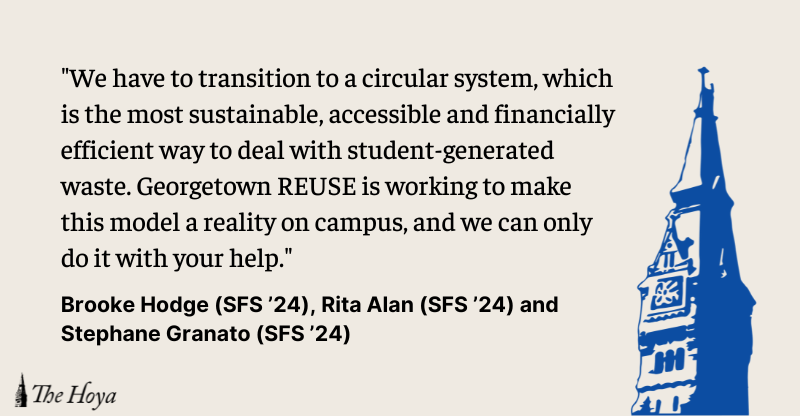Moving onto campus for the first time after the pandemic was chaotic for all three of us. As the summer came to a close in August 2021, Rita’s family filled a minivan to the brim and drove up from South Carolina, Stephane drove down from Connecticut and Brooke flew six hours from California. With two days until the start of classes, we all rushed to Target or Bed Bath & Beyond and scoured Amazon to find the necessary goods and materials for our dorms and classes. And, at the end of that year, we all moved out alone less than 24 hours after our last final, struggling to pack and dispose of the items we no longer needed without missing our flights or trains. Our experiences, though not identical, demonstrate a common problem of consumption and waste at Georgetown.
Georgetown has a waste problem that every Georgetown student has seen, experienced and contributed to. Yet even with the dumpsters overflowing with undamaged clothing and functional dorm materials at the end of each semester, we can’t simply blame students’ behavior. In an environment where students’ time is being pulled in so many different directions, it’s not a surprise that even the most environmentally conscious students opt for the convenient disposable options. The core of our waste problem isn’t behavioral — it’s systemic. And it demands a solution that reshapes our current linear system of consumption and disposal to a circular one of reuse.
We don’t rely on large chain retail stores at the beginning of the year because we prefer their goods. We do it because there are certain things we need — our first laptop, school supplies or bedding — and there are no affordable, accessible or sustainable alternatives that are easy to find. It can take hours of searching on Facebook Marketplace for a simple lamp and long, expensive rides to a thrift store for a coat, options that seem particularly daunting especially when Amazon presents a faster, cheaper and more accessible alternative.
Throughout the year, most students simply don’t have the time or energy to track down donation sites or to list items on a reselling platform. Even with the Move Out Drive, an end-of-year collection for the Georgetown community to donate certain gently used goods to local charities, students still leave barely used books, clothing with tags, fully functioning sets of drawers and even Apple Pencils and iHome speakers in dumpsters.
Despite these difficulties, student demand for a more circular sustainable system is apparent. The emergence and success of the Selling and Bartering GroupMe, the Red Square clothing swaps hosted by Georgetown Renewable Energy and Environmental Network (GREEN) and the Uncommon Threads thrift racks run by GREEN and The Corp, clearly demonstrate that students are willing to donate their unused or lightly used goods, as well as to buy those products secondhand.
We came up with the idea for Georgetown REUSE when we first arrived on campus our sophomore year. Sitting on the lawn behind Leo’s, we envisioned creating a system where dorm materials, school supplies and clothing could be diverted from our dumpsters and repurposed for students to buy at extremely reduced prices. After two years of pilot projects, we founded and incorporated Georgetown REUSE in September 2022 along with Elizabeth Packard (CAS ’25), Eleanor Hohenberg (CAS ’25), Willow Volkert (CAS ’25) and Paul Aversa (SFS ’25).
With this organization, we hope to increase the accessibility of necessary goods, reduce waste and promote a circular system of consumption on campus. Once we launch this spring, we will be partnering with different groups on campus to host pop-up sales, which will also act as drop-off locations for donations.
As a Georgetown community, we pride ourselves on our commitment to be “People for Others” and to “Care for Our Common Home.” As students, we must change the way we manage our waste if we hope to truly embody those values. On-campus waste management will not be fixed by waving our finger at students who choose the cheaper and more convenient options. We have to transition to a circular system, which is the most sustainable, accessible and financially efficient way to deal with student-generated waste. Georgetown REUSE is working to make this model a reality on campus, and we can only do it with your help.
We will work to provide local and affordable options for the goods you need — we ask you, in turn, to take a moment to reflect before consuming and disposing, and to ask yourself how your choices can best contribute to this circular system we are trying to foster. Before you throw out, seek out one of our donation sites (coming soon), and before you add to your basket, check the dates for our pop-ups or seek out another secondhand option on campus. By doing this together, we can take better care of our community and common home.
Brooke Hodge is a junior in the School of Foreign Service and the chief executive officer of REUSE. Rita Alan is a junior in the School of Foreign Service and the chief marketing officer of REUSE. Stephane Granato is a junior in the School of Foreign Service and the chief operating officer of REUSE.














